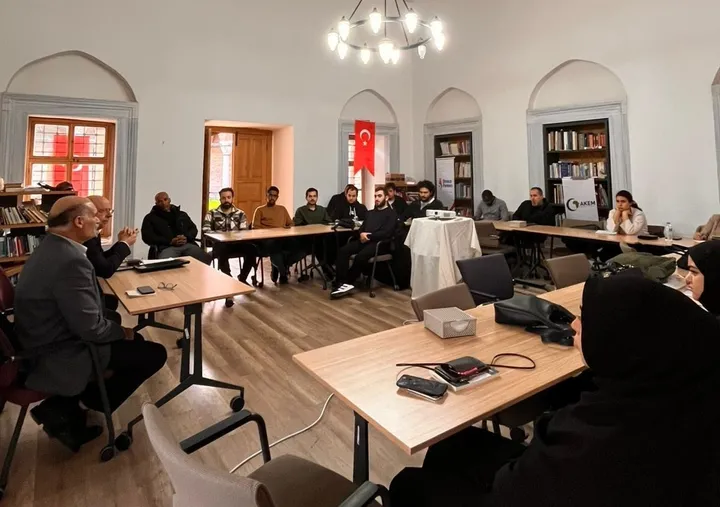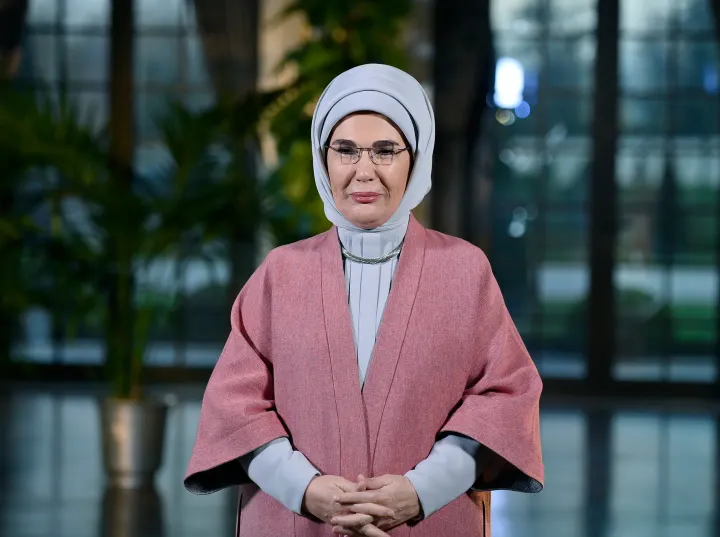By Karya Naz Balkiz
Türkiye is considering a social media age limit, joining a global movement to protect children from the increasing risks associated with platforms like TikTok, Instagram, and X.
Speaking at an event in Istanbul on Monday, Turkish President Recep Tayyip Erdogan stressed, “We cannot leave our children unattended in the chaotic climate of digital media,” and warned that screen addiction is “spreading like a plague.”
Days later, Family and Social Services Minister Mahinur Ozdemir Goktas stated that the age restrictions would be implemented in two phases: one for children under 13 and another for those aged 13 to 16.
Social media platforms operate on the principle of capturing attention, and algorithms are meticulously designed to maximise engagement.
“Children and teenagers are more vulnerable to the negative effects of social media, especially because their sense of self and identity are not yet fully developed,” says Specialist Clinical Psychologist Deniz Tan Kumcuoglu, who works at Türkiye’s renowned psychiatry centre, Madalyon.
Children, particularly vulnerable to external influence, are easy targets in this digital environment.
One concerned parent is Duygu Akman from Ankara. “I don’t let my 9-year-old son use social media. I don’t think a child that age is mentally and emotionally prepared for that environment,” she tells TRT World.
Social media and mental disorders
According to Tan Kumcuoglu, exposure to social media from an early age can lead to a range of psychological issues in the long term, including anxiety, depression, and body image concerns.
Cyberbullying is one common problem, often resulting in increased stress and social withdrawal, fuelling anxiety and depression. Heavily filtered content on social media also fosters unrealistic standards, facilitating self-esteem issues, body dysmorphia, eating disorders, and several other mental issues.
Excessive screen time during the early years of life also affects cognitive abilities.
“Since brain development is still ongoing, prolonged exposure to social media can contribute to attention deficits, learning difficulties, and diminished social interaction skills,” Tan Kumcuoglu says.
Moreover, the constant need for digital interaction and the need for external approval increases the risk of technology addiction.
“As a previous social media user, I know how time-consuming social media can be. It distorts perception, steals you away from the present moment, and distracts you. It’s a great risk, even for adults,” Akman says, recalling why she quit using social media years ago.
Little exposure, big impact
Although Akman closely monitors her son's digital activity and imposes strict screen time limits, like no tablet or phone during weekdays, she has noticed behavioural shifts even after brief exposure. Among her main concerns is social media’s effect on patience and focus.
During the weekends, when her son gets to watch kids' shows on YouTube for a limited time, Akman observes heightened restlessness, irritability, and hyperactivity.
“Fast-paced content weakens children's ability to concentrate. When my son reads a book after screen time, he rushes to the end rather than enjoying the story. Being patient, processing information, and appreciating the journey is becoming increasingly difficult for children,” she says.
But that’s not all. These psychological effects are merely the tip of the iceberg when it comes to the digital risks that threaten children's well-being and development.
Harmful content and online predators
For parents like Akman, disinformation is one of the biggest dangers of social media.
“Because children have not yet fully developed critical thinking skills, they may take every piece of information they encounter as fact. This can lead them to misperceive the world, develop fears, or be easily misled.”
Speaking to TRT World, her son recalls coming across a video from a few years ago that scared him. “I think it was meant to scare kids. I used to have nightmares about it,” the 9-year-old says.
Dangerous trends and challenges that spread rapidly on social media, like the cinnamon challenge, can also drag children into risky experiences, Akman adds.
Another major concern is children’s exposure to inappropriate content and online predators. “Minors may come across material unsuitable for their age or become targets for individuals with malicious intent,” clinical psychologist Tan Kumcuoglu warns.
In August, Türkiye blocked access to the popular video game Roblox following investigations that uncovered child exploitation on the platform. Similar concerns have emerged in multiple countries, as predators often disguise themselves in virtual spaces, luring children into dangerous situations.
Discord was also banned in Türkiye last October over similar concerns regarding child exploitation.
“Allowing a child’s developing mind to be swept into such an uncontrolled environment is a serious risk,” Akman warns, emphasising that social media is far more than just fun videos and innocent content — what children encounter online rarely has reliable filters to guarantee that it is suitable for their age.
What’s being done?
Türkiye’s Transport and Infrastructure Minister Abdulkadir Uraloglu announced last week that authorities are considering social media access restrictions for those under 16.
“Our children must reach an age where they can make independent decisions based on objective criteria” before using social media, Uraloglu stated in a televised interview on private broadcaster CNN Turk.
Regarding the current restrictions on Discord and Roblox, Uraloglu said access could be reinstated if the platforms comply with regulations and offer “valuable content while eliminating harmful aspects.”
Türkiye’s proposed regulations align with global efforts to enforce stricter social media policies for minors. Australia recently became the first country to ban under-16s from social media entirely, with Prime Minister Anthony Albanese saying there is a “clear, causal link between the rise of social media and the harm [to] the mental health of young Australians.”
Indonesia is also planning to set a minimum age for social media users. Norway already has a ban in place for children under 13 and is raising the age limit to 15.
In the UK, technology secretary Peter Kyle confirmed that the country was considering a similar ban.
France has also joined the movement. President Emmanuel Macron has proposed a plan to require parental approval for children and adolescents under 15 to access the digital space across the European Union.
Necessary precautions
Despite the risks, Akman acknowledges that social media has become an unignorable part of daily life. She says completely avoiding social media isn’t feasible because it’s clearly here to stay.
Considering current realities, experts stress the need for responsible management. “Age restrictions can significantly reduce risks, but proper age verification systems must be enforced,” Tan Kumcuoglu tells TRT World.
She also highlights the role of parents in fostering a healthier digital environment.
“Beyond regulations, parental awareness and active guidance are just as crucial. A combination of legal measures, educational efforts, and parental engagement can create a safer and more balanced online experience for children.”
























